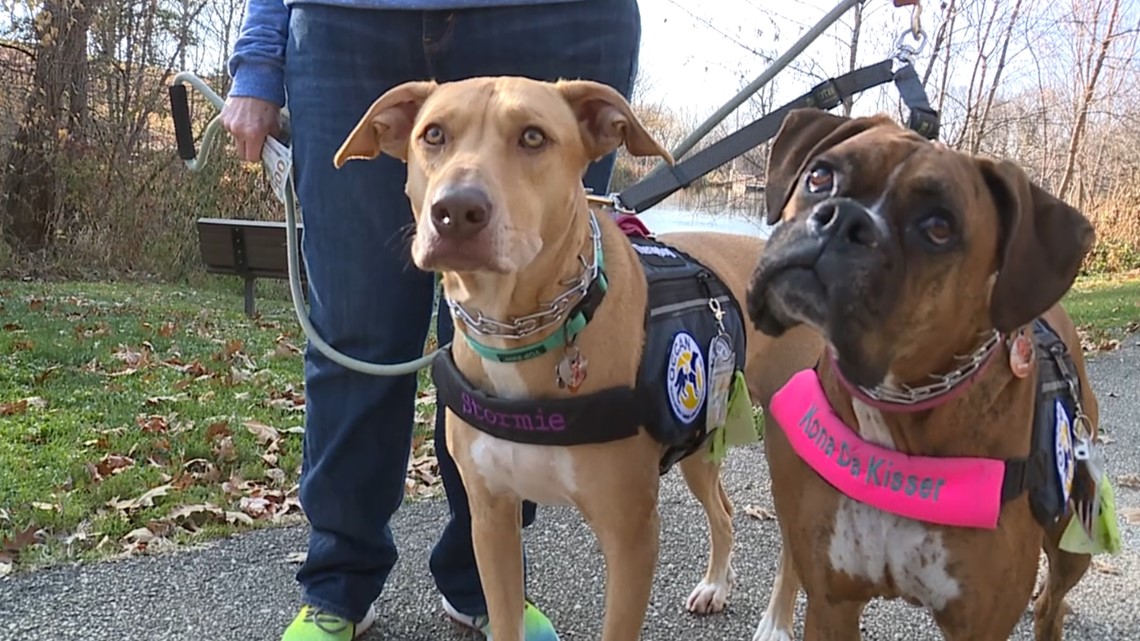- November 25, 2022
- No Comment
- 7 minutes read
Pay It Forward | Training man's best friend for therapy – WQAD Moline

MOLINE, Ill. — Angie Hall is the president and head trainer for the Quad Cities Canine Assistance Network (QC CAN), a 501c3 and the only American Kennel Club-certified therapy dog organization in the greater Quad Cities Area.
Angie became involved in QC CAN in 2012 with her first basset hound, Mater, who she had rescued from a shelter and nursed back to health. She noticed he has a way of connecting with people and decided that’s how she would be able to give back to her community.
Unfortunately, he has recently passed away. But now, she has his understudies, Sally and Mo, who are basset hounds, and Oliver, a black lab.
“Any dog can be a therapy dog as long as they have a good temperament, meaning that they don’t mind different people, they don’t mind being around different dogs, they’re calm and relaxed,” Hall said. “It doesn’t matter if it’s a young puppy or older dog. Any dog, any breed, can be a therapy dog.”
Diversity in dog sizes and personalities is very important to the group and the different types of people they serve.
“Some people like little dogs, some people like excited dogs, some people like big dogs, some people like calm dogs.,” Hall said. “So it’s nice to have a mix that we can share with the community.”
“I got involved because my mom was living in an IRC at the time and wanted to be able to take my dog up there to see her and visit with her” QC CAN’s Monica German said.
After her dogs, Kona and Stormy, got the training they needed, she decided to stay and become a part of the organization.
“Just to see the benefit that it brings to [and] joy to people. In the nursing homes, they just light up,” German said. “It’s just like their joy for the day. And the kids; they love to read to the dogs. That gives them a lot of practice on reading while they’re reading to the dog.”
The family environment that Hall creates is another reason why German stayed with the organization after her training was done.
“I like to think of us at QC CAN as family members, so every member is a family member to me and that we can connect with each other,” Hall said. “We’re not just healing our community, making a difference in our community. We’re making a difference in each other lives as well.”
One of the most impactful things that Monica has seen since being with the organization is trips to mental health facilities like Eagle View Behavioral Health.
“It’s just so awesome to see the therapy dogs work in mental facilities and helping kids and its adults. That’s one of my favorite places to go,” German said.
QC CAN is also heavily involved in outreach programs:
There’s the Reading Education Alliance of Dogs, which helps improve the literacy skills of children through the assistance of registered therapy teams as literacy mentors. Therapy dogs and their handlers go to local libraries and schools throughout the QCA.
“Dogs don’t judge, they just listen. So, it doesn’t matter if the kids are good readers or not,” Hall said. “The dogs are there to be a calming presence and to encourage kids to open up…some kids never read out loud, but they do when there’s a dog present.”
There’s Canines Assisting at rest homes, events, and schools. With these events, having a therapy dog can lessen the emotional weight that people experience, recovering from injuries or loneliness. Therapy dogs can help lighten and lift the mindset of patients to the point of recovery or even personal growth.
“We train our dogs to be calm and relaxed in almost any situation. And that calmness helps bring peace to people who are visiting with the dogs,” Hall said.
In the Assisting Crisis and Trauma Situations program, dogs are trained to provide emotional comfort and support to people affected by the impacts of crisis events. They provide comfort to those who have been affected by natural, human-caused or technological disasters. Therapy dogs are not mental health interventions, but can provide support in the immediate wake of a crisis through listening, empathy, and sharing unconditional love.
As mental health has become more widely understood and prioritized in recent years, QC CAN has experienced an increase in requests.
“We’re doing a lot more visits to the mental health facilities throughout the area,” Hall noted.
The organization is averaging about two events a week. They usually do between three to four hundred events a year and this year, they may break that average.
“I think that every person has a purpose and that every person can make a difference,” Hall said. “And I found that in QC CAN, not only helping those in our community, but our members as well, giving them a chance to make a difference, helping them find their purpose, and looking at the work that all in QC CAN can do, helping change our community. Everybody could use a bit more smile a little bit more laughter in their lives and that’s what we can bring to the community with our therapy dogs.”
If you would like to get involved with QC CAN, you can do so through qccan.org.
► Download the WQAD News 8 App
► Subscribe to our newsletter
► Subscribe to our YouTube channel
Watch more news, weather and sports on News 8’s YouTube channel
Next up in 5
Example video title will go here for this video
In Other News
Notifications can be turned off anytime in the browser settings.

